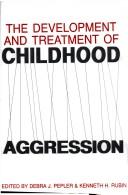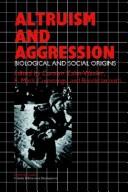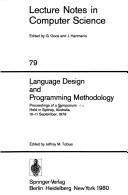| Listing 1 - 7 of 7 |
Sort by
|
Book
ISBN: 3862194272 9783862194278 9783862194261 3862194264 Year: 2013 Publisher: Kassel : Kassel University Press,
Abstract | Keywords | Export | Availability | Bookmark
 Loading...
Loading...Choose an application
- Reference Manager
- EndNote
- RefWorks (Direct export to RefWorks)

ISBN: 080580370X Year: 1991 Publisher: Hillsdale, NJ : Lawrence Erlbaum Associates [LEA],
Abstract | Keywords | Export | Availability | Bookmark
 Loading...
Loading...Choose an application
- Reference Manager
- EndNote
- RefWorks (Direct export to RefWorks)
#PBIB:2000.1 --- Aggressiveness in children --- Aggression --- Ontwikkelingspsychologie --- Congresses. --- in infancy & childhood --- congresses. --- speciale problemen --- speciale problemen. --- In infancy & childhood --- Speciale problemen. --- Aggressiveness (Child psychology) --- Aggressiveness (Psychology) in children --- Child psychology --- Conduct disorders in children --- Congresses
Book
ISBN: 2760519899 9782760519893 2760515621 9782760515628 9782760515628 Year: 2009 Publisher: Quebec : Presses de l'Universite du Quebec,
Abstract | Keywords | Export | Availability | Bookmark
 Loading...
Loading...Choose an application
- Reference Manager
- EndNote
- RefWorks (Direct export to RefWorks)
Aggressiveness in children. --- Problem children --- Child development. --- Aggressiveness in children --- Psychology. --- Prevention. --- Aggressiveness (Child psychology) --- Aggressiveness (Psychology) in children --- Child study --- Children --- Development, Child --- Difficult children --- Maladjusted children --- Development --- Child psychology --- Conduct disorders in children --- Developmental biology --- Developmental psychobiology --- Child rearing --- Behavior disorders in children --- Agressivité chez l'enfant --- Enfants --- Enfants difficiles --- Agressivité chez l'enfant. --- Prévention. --- Développement. --- Psychologie.

ISBN: 0521268346 0521423678 0511752830 Year: 1986 Volume: vol *3 Publisher: Cambridge : Cambridge University Press,
Abstract | Keywords | Export | Availability | Bookmark
 Loading...
Loading...Choose an application
- Reference Manager
- EndNote
- RefWorks (Direct export to RefWorks)
In this timely collection, biological and behavioral scientists address questions emerging from new research about the origins and interconnections of altruism and aggression within and across species. They explore the genetic underpinnings of affiliative and aggressive orientations as well as the biological correlates of these behaviors. They consider environmental variables - family patterns, child rearing practices - that influence prosocial and antisocial behaviors. And they examine internal processes such as empathy, socio-inferential abilities, and cognitive attributions, that regulate 'kindness' and 'selfishness'. The first section focuses on biological, sociobiological, and ethological approaches. It explores the utility of animal models for understanding both human and infrahuman social behavior. The second section focuses on the development, socialization, and mediation of altruism and aggression in children. Several concerns underly both sections. These include the role of attachment processes, separation distress, reciprocal interchanges, and social play in determining the quantity and quality of aggressive and affiliative interactions; the function of emotions (e.g. empathy, guilt, and anger) as instigators of altruism and aggression; and the nature of sex differences. Several chapters present data on emotions that mediate altruism and aggression and also on patterns of association between prosocial and antisocial behaviors. The authors take an ethological perspective, placing special importance on the need to explore altruism and aggression in the real lives and natural habitats of humans and other animals.
Aggression. --- -Altruism in children --- -Psychology, Comparative --- -Aggressiveness (Child psychology) --- Behavior, Comparative --- Comparative behavior --- Comparative psychology --- Ethology, Comparative --- Intelligence of animals --- Instinct --- Altruistic behavior --- Unselfishness --- Beneficence --- Gift Giving --- Aggressions --- Altruism in children --- Aggressiveness in children --- Aggressiveness --- Altruism --- Psychology, Comparative --- Socialization --- Aggression --- Child --- Infant --- Social Behavior --- Socializations --- Social Learning --- Personality Development --- Behavior, Social --- Behaviors, Social --- Social Behaviors --- Infants --- Children --- Minors --- Humanitarianism --- Conduct of life --- Helping behavior --- Child psychology --- Aggressiveness (Child psychology) --- Aggressiveness (Psychology) in children --- Conduct disorders in children --- Congresses --- Socialization. --- Congresses. --- in infancy & childhood --- congresses. --- Psychology [Comparative ] --- Altruism in children - Congresses. --- Aggressiveness (Psychology) in children - Congresses. --- Altruism - Congresses. --- Aggressiveness (Psychology) - Congresses. --- Psychology, Comparative - Congresses. --- Socialization - Congresses. --- Sociality --- Prosocial Behavior --- Behavior, Prosocial --- Behaviors, Prosocial --- Prosocial Behaviors --- Health Sciences --- Psychiatry & Psychology --- In infancy & childhood
Book
ISBN: 3319530283 3319530275 Year: 2017 Publisher: Cham : Springer International Publishing : Imprint: Springer,
Abstract | Keywords | Export | Availability | Bookmark
 Loading...
Loading...Choose an application
- Reference Manager
- EndNote
- RefWorks (Direct export to RefWorks)
This compact resource synthesizes current research on bullying in the schools while presenting strengths-based approaches to curbing this growing epidemic. Its international review of cross-sectional and longitudinal studies unravels the complex dynamics of bullying and provides depth on the range of negative outcomes for bullies, victims, enablers, and victims who bully. Chapters on protective factors against bullying identify personal competencies, such as empathy development, and keys to a positive school environment, featuring findings on successful school-based prevention programs in different countries. Throughout, the authors clearly define bullying as a public health/mental health issue, and prevention as a deterrent for future antisocial and criminal behavior. Included in the coverage: · School bullying in different countries: prevalence, risk factors, and short-term outcomes. · Personal protective factors against bullying: emotional, social, and moral competencies. · Contextual protective factors against bullying: school-wide climate. · Protecting children through anti-bullying interventions. · Protecting bullies and victims from long-term undesirable outcomes. · Future directions for research, practice, and policy. With its wealth of answers to a global concern, Protecting Children against Bullying and Its Consequences is a definitive reference and idea book for the international community of scholars in criminology and developmental psychology interested in bullying and youth violence, as well as practitioners and policymakers. .
Bullying --- Aggressiveness in children. --- Prevention. --- Aggressiveness (Child psychology) --- Aggressiveness (Psychology) in children --- Psychology. --- Psychology --- Psychological measurement. --- Psychological Methods/Evaluation. --- General Psychology. --- Methodology. --- Child psychology --- Conduct disorders in children --- Psychological tests and testing. --- Philosophy (General). --- Psychology—Methodology. --- Behavioral sciences --- Mental philosophy --- Mind --- Science, Mental --- Human biology --- Philosophy --- Soul --- Mental health --- Measurement, Mental --- Measurement, Psychological --- Psychological measurement --- Psychological scaling --- Psychological statistics --- Psychometry (Psychophysics) --- Scaling, Psychological --- Psychological tests --- Scaling (Social sciences) --- Measurement --- Scaling --- Methodology --- Psychological Methods. --- Behavioral Sciences and Psychology.
Book
ISBN: 9781412996433 9781412996426 1412996430 1412996422 Year: 2011 Publisher: Thousand Oaks : SAGE Publications,
Abstract | Keywords | Export | Availability | Bookmark
 Loading...
Loading...Choose an application
- Reference Manager
- EndNote
- RefWorks (Direct export to RefWorks)
Mass media and children. --- Mass media and teenagers. --- Children and violence. --- Youth and violence. --- Violence in mass media. --- Aggressiveness in children. --- Aggressiveness in adolescence. --- Aggressiveness in adolescence --- Aggressiveness in children --- Children and violence --- Mass media and children --- Mass media and teenagers --- Violence in mass media --- Youth and violence --- #SBIB:309H402 --- 316.774.16 --- Violence and youth --- Violence --- Mass media --- Teenagers and mass media --- Teenagers --- Children and mass media --- Children --- Violence and children --- Violence in children --- Aggressiveness (Child psychology) --- Aggressiveness (Psychology) in children --- Child psychology --- Conduct disorders in children --- Aggressiveness (Psychology) in adolescence --- Adolescent psychology --- 316.774.16 Massamedia: maatschappelijk, politiek, ideologisch, ethisch, juridisch, socio-cultureel--(communicatiesociologie) --- Massamedia: maatschappelijk, politiek, ideologisch, ethisch, juridisch, socio-cultureel--(communicatiesociologie) --- Media en publiekgroepen: gebruik van de boodschap, effecten van de media, .. --- Media en publiekgroepen: gebruik van de boodschap, effecten van de media, . --- Media en publiekgroepen: gebruik van de boodschap, effecten van de media,

ISBN: 0387097430 0387097449 9786611953836 1281953830 0387097457 3540097457 3540385797 3540097430 3540385754 9783540097433 9783540097457 9780387097459 9780387097442 Year: 1980 Volume: 176 Publisher: Berlin : Springer-Verlag,
Abstract | Keywords | Export | Availability | Bookmark
 Loading...
Loading...Choose an application
- Reference Manager
- EndNote
- RefWorks (Direct export to RefWorks)
Antisocial acts by children and teens are on the rise – from verbal abuse to physical bullying to cyber-threats to weapons in schools. Strictly punitive responses to aggressive behavior may even escalate a situation, leaving peers, parents, and teachers feeling helpless. This unique volume conceptualizes aggression as a symptom of underlying behavioral and emotional problems and examines the psychology of perpetrators and the power dynamics that foster intentionally hurtful behavior in young people. It details for readers how bibliotherapy offers relevant, innovative, and flexible treatment – as a standalone intervention or as a preventive method in conjunction with other forms of treatment – and can be implemented with individuals and groups, parents, teachers, and even rivals. Treating Child and Adolescent Aggression Through Bibliotherapy: Offers research-based guidelines for treating aggression in children and adolescents. Provides an integrative approach to treating aggressive children and youth to more fully address the complex nature of antisocial behavior. Sets out a practical framework for bibliotherapy, choosing developmentally appropriate materials, identifying themes for discussion, matching selections to therapeutic progress, and more. Demonstrates individual and group bibliotherapy sessions with male and female children and adolescents. Includes a complete session-by-session prevention program for the classroom. Features an appendix of suggestions for effective therapeutic literature. This unique, must-have resource is essential reading for school psychologists, school counselors, social workers, and clinical child psychologists and any allied educational and mental health professionals who work with troubled youth.
Aggression -- Psychology. --- Aggressiveness in adolescence -- Treatment. --- Aggressiveness in children -- Treatment. --- Bibliotherapy for children. --- Bibliotherapy for teenagers. --- Aggressiveness in children --- Aggressiveness in adolescence --- Bibliotherapy for children --- Bibliotherapy for teenagers --- Psychology --- Bibliotherapy --- Aggression --- Adolescent --- Child --- Methods --- Behavioral Sciences --- Social Behavior --- Age Groups --- Investigative Techniques --- Behavioral Symptoms --- Rehabilitation --- Psychotherapy --- Behavioral Disciplines and Activities --- Behavior --- Analytical, Diagnostic and Therapeutic Techniques and Equipment --- Therapeutics --- Persons --- Behavior and Behavior Mechanisms --- Named Groups --- Psychiatry and Psychology --- Pediatrics --- Medicine --- Health & Biological Sciences --- Treatment --- Treatment. --- Aggressiveness (Psychology) in adolescence --- Aggressiveness (Child psychology) --- Aggressiveness (Psychology) in children --- Tools and techniques: decision tables flow charts modules and interfaces programmer workbench software libraries structured programming top-down programming user interfaces (Software engineering) --- language classifications: applicative languages data-flow languages design languages extensible languages macro and assembly languages nonprocedural languages specialized application and very high-level languages (Programminglanguages) --- Languages constructs: abstract data types concurrent programming structurescontrol structures coroutines (Programming languages) --- Process management: concurrency deadlocks multiprocessing/multiprogrammingmutual exclusion scheduling synchronization (Operating systems) --- 681.3*D33 Languages constructs: abstract data types concurrent programming structurescontrol structures coroutines (Programming languages) --- 681.3*D32 language classifications: applicative languages data-flow languages design languages extensible languages macro and assembly languages nonprocedural languages specialized application and very high-level languages (Programminglanguages) --- 681.3*D22 Tools and techniques: decision tables flow charts modules and interfaces programmer workbench software libraries structured programming top-down programming user interfaces (Software engineering) --- 681.3*D41 Process management: concurrency deadlocks multiprocessing/multiprogrammingmutual exclusion scheduling synchronization (Operating systems) --- Diminishing returns --- Multiplication, Complex. --- Psychology. --- Education. --- Social work. --- Clinical psychology. --- Psychotherapy. --- Counseling. --- Child psychology. --- School psychology. --- Personality. --- Social psychology. --- Clinical Psychology. --- Child and School Psychology. --- Education, general. --- Psychotherapy and Counseling. --- Social Work. --- Personality and Social Psychology. --- Programming --- 681.3*A0 --- 681.3*D22 --- 681.3*D32 --- 681.3*D33 --- 681.3*D41 --- 681.3*D33 Languages constructs: abstract data types; concurrent programming structures;control structures; coroutines (Programming languages) --- Languages constructs: abstract data types; concurrent programming structures;control structures; coroutines (Programming languages) --- 681.3*D32 language classifications: applicative languages; data-flow languages; design languages; extensible languages; macro and assembly languages; nonprocedural languages; specialized application and very high-level languages (Programminglanguages) --- language classifications: applicative languages; data-flow languages; design languages; extensible languages; macro and assembly languages; nonprocedural languages; specialized application and very high-level languages (Programminglanguages) --- 681.3*D22 Tools and techniques: decision tables; flow charts; modules and interfaces; programmer workbench; software libraries; structured programming; top-down programming; user interfaces (Software engineering) --- Tools and techniques: decision tables; flow charts; modules and interfaces; programmer workbench; software libraries; structured programming; top-down programming; user interfaces (Software engineering) --- 681.3*A0 General --- General --- 681.3*D41 Process management: concurrency; deadlocks; multiprocessing/multiprogramming;mutual exclusion; scheduling; synchronization (Operating systems) --- Process management: concurrency; deadlocks; multiprocessing/multiprogramming;mutual exclusion; scheduling; synchronization (Operating systems) --- Adolescent psychotherapy --- Child psychotherapy --- Adolescent psychology --- Child psychology --- Conduct disorders in children --- Curves, Elliptic. --- Programming languages (Electronic computers) --- Computer programming --- Langages de programmation --- Programmation (Informatique) --- Congresses --- Congrès --- Psychology, clinical. --- Developmental psychology. --- Applied psychology. --- Consciousness. --- Apperception --- Mind and body --- Perception --- Philosophy --- Spirit --- Self --- Benevolent institutions --- Philanthropy --- Relief stations (for the poor) --- Social service agencies --- Social welfare --- Social work --- Human services --- Applied psychology --- Psychagogy --- Psychology, Practical --- Social psychotechnics --- Development (Psychology) --- Developmental psychobiology --- Life cycle, Human --- Software engineering. --- Software Engineering. --- Computer software engineering --- Engineering --- Children --- Education, Primitive --- Education of children --- Human resource development --- Instruction --- Pedagogy --- Schooling --- Students --- Youth --- Civilization --- Learning and scholarship --- Mental discipline --- Schools --- Teaching --- Training --- Psychology, School --- Psychology, Applied --- Behavior, Child --- Child behavior --- Child study --- Pediatric psychology --- Child development --- Developmental psychology --- Psychiatry --- Psychological tests --- Mass psychology --- Psychology, Social --- Human ecology --- Social groups --- Sociology --- Personal identity --- Personality psychology --- Personality theory --- Personality traits --- Personology --- Traits, Personality --- Individuality --- Temperament --- Counselling --- Helping behavior --- Clinical sociology --- Interviewing --- Personal coaching --- Social case work --- Therapy (Psychotherapy) --- Mental illness --- Mental health counseling --- Education --- Logique --- Courbes elliptiques --- Nombres, Théorie des --- Langages de programmation.
| Listing 1 - 7 of 7 |
Sort by
|

 Search
Search Feedback
Feedback About UniCat
About UniCat  Help
Help News
News